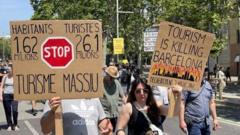Locals are calling for better management of tourism, citing rising rents and the displacement of residents as major concerns.
**Growing Opposition to Tourism in Barcelona: Residents Demand Change**

**Growing Opposition to Tourism in Barcelona: Residents Demand Change**
Protests erupt in Barcelona as residents voice their frustrations over the impacts of mass tourism.
The streets of Barcelona echoed with shouts of "Go Home!" as local protesters marched through the city on Sunday, directly addressing tourists and voicing their opposition to the excessive influx of visitors. The demonstrations, characterized by water pistols aimed at bemused couples and stickers plastered on luxury storefronts, underline the growing resentment among residents who feel their city is being overtaken by tourism.
The picturesque city is renowned as a top destination, with more than 15 million tourists visiting last year, dwarfed by the local population of approximately 1.6 million. This surge in popularity has stirred discontent among locals, particularly with regards to the rising cost of living. Protester Marina, holding a sign that read, "Your AirBnB used to be my home," articulated the dilemma many face: expensive rents often attributed to short-term rentals catering to tourists. "We cannot live in this city," she lamented.
The struggle is not limited to the young. Elderly resident Pepi Viu, recently evicted from her home of nearly a decade, highlighted her plight as she searched for affordable housing amidst a 70% increase in rental prices. "There's only tourist flats now," she stated, pointing to the urgent need for affordable housing for long-term residents. Many locals echo her sentiments, emphasizing that gentrification driven by tourism has eroded their communities.
In the heart of Barcelona, Joan Alvarez fights to retain his family's flat, a long-term rental being threatened by rising demands for short-term tourist accommodations. "It's not just about money; it's about principle," he asserted, discussing the importance of retaining residential spaces in the face of rampant commercialization of housing.
On the landlords' side, Jesus Pereda, who operates rental flats, argues that short-term rentals are being unfairly targeted as the sole culprit for soaring rents. He believes the influx of remote workers, often referred to as digital nomads, is a major driver of the housing crisis. "We're convenient scapegoats," he claimed, warning that the proposed ban on short-term rentals could exacerbate the crisis for local landlords and the economy, which heavily relies on tourism.
As the protest culminated in raucous chants and firecrackers, tensions grew between locals and a noticeable police presence. The discontent is part of a broader trend seen in various European tourist hotspots, echoing concerns about the sustainability of tourism in vibrant urban centers. Amidst these protests, Spain is bracing for yet another record-breaking summer of tourism, leaving questions of balance and community welfare at the forefront of public discourse.
The picturesque city is renowned as a top destination, with more than 15 million tourists visiting last year, dwarfed by the local population of approximately 1.6 million. This surge in popularity has stirred discontent among locals, particularly with regards to the rising cost of living. Protester Marina, holding a sign that read, "Your AirBnB used to be my home," articulated the dilemma many face: expensive rents often attributed to short-term rentals catering to tourists. "We cannot live in this city," she lamented.
The struggle is not limited to the young. Elderly resident Pepi Viu, recently evicted from her home of nearly a decade, highlighted her plight as she searched for affordable housing amidst a 70% increase in rental prices. "There's only tourist flats now," she stated, pointing to the urgent need for affordable housing for long-term residents. Many locals echo her sentiments, emphasizing that gentrification driven by tourism has eroded their communities.
In the heart of Barcelona, Joan Alvarez fights to retain his family's flat, a long-term rental being threatened by rising demands for short-term tourist accommodations. "It's not just about money; it's about principle," he asserted, discussing the importance of retaining residential spaces in the face of rampant commercialization of housing.
On the landlords' side, Jesus Pereda, who operates rental flats, argues that short-term rentals are being unfairly targeted as the sole culprit for soaring rents. He believes the influx of remote workers, often referred to as digital nomads, is a major driver of the housing crisis. "We're convenient scapegoats," he claimed, warning that the proposed ban on short-term rentals could exacerbate the crisis for local landlords and the economy, which heavily relies on tourism.
As the protest culminated in raucous chants and firecrackers, tensions grew between locals and a noticeable police presence. The discontent is part of a broader trend seen in various European tourist hotspots, echoing concerns about the sustainability of tourism in vibrant urban centers. Amidst these protests, Spain is bracing for yet another record-breaking summer of tourism, leaving questions of balance and community welfare at the forefront of public discourse.


















